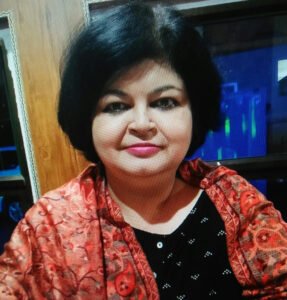The Nameless One
The Nameless One
Indrani Rai Medhi
Dear you,
It is strange to call you so, as if you do not have a name. But you do, and I was forbidden, in the early days of our marriage, to put that name on you, to grow close to you in the articulation of that name in the little, everyday routine of our lives. But it never happened, not even when we moved to our own house. There were so many ways I thought of the absence of your name on my tongue. In the early days, when love rose unbidden in my heart, your name, whispered in empty rooms, secretly, felt like a plum bursting with juices in my mouth.
Dear you, if only we had talked about the important things in life… not how the water pump was leaking again, or the fridge was not cooling enough. How Sharma’s dogs were keeping us awake at night and that Ma’s photo with the broken glass, needed to be repaired. How it was important for you to see my bank account so that I was not giving money to my mother and sisters. I could not for instance persuade you to watch the roseate clouds piled high on a pale sky where the evening star already shone. I could not tell you for instance, how a hill stream carried me as a child away for terrifying minutes. But yours was the world of receipts and invoices, tax bills, seated at the table, impassive, while outside the clouds piled over our house, whispering poetry.
Dear you,
In the ten years we have been together, we have been happy, in our own ways. Happy when expect nothing from each other, happy when you need not touch each other because the act of coupling is quick, embarrassing and unclean. We have nothing to say to each other and that saves us from misunderstanding. Sometimes I feel the words have shriveled like petals and died at my throat and you will not notice.
You should have guessed it the first time. Seventeen pills and half a bottle of rum, gagging, as a pipe explored my insides at the clinic. After a day you brought me home. You got me apples. But you never asked me, how, a healthy, 35-year-old woman, wanted to end it all.
It perhaps never occurred to you that you were the problem. That you studied tax bills while the roseate clouds whispered poetry above.
“Don’t embarrass me again,” you said that night as you switched off the night lamp and turned your back to me.
Embarrass. Such an interesting word. You stumble on the road, you mistake someone for somebody else. You bump against somebody. Your shopping bag tears and potatoes and tomatoes spill on the street. You forget the name of the person who has called out to you. You utter an innuendo without meaning to. My frayed purse. My three good saris. My mother and sisters knowing things about you without being told. You peering at my bank account. That is embarrassing, a lifetime of it.
After the pills and the rum, I realised that it was impossible to die. They had implements that sucked out what you ingested and your husband warned you to never embarrass him. Switching off the light. A trivial act of trying to die. Of no consequence ever. Nobody was told.
Dear you, you could have listened. We could have met halfway. We could have shut off the leaking machine. You could have not called my death embarrassing.
But all that does not matter now. My bag is packed with the collected poems of Emily Dickinson, three good saris, the frayed purse, the discharge slip at the hospital. Strangely I am proud of it. A road almost taken. Life is full of coincidences. Your office colleague Arun invited us to their anniversary party. I had to go, you said, because it would be embarrassing. So I wore one of the three embarrassing saris, climbed my embarrassing self into my battered sandals and got into the car.
Arun and Sheela were a surprise. They were jolly, talkative, filled their walls with Anjolie Ela Menon and flirted openly with each other. There two sons, rumbunctious boys oudid each other in gobbling pastries. Sheela took me to see her garden, star-like flowers in the dark foliage.
Then you and I got back into the car. It was late and I could see the shop shutters down. A city with a desolate air. The sugarcane man, with his blue cart, pushing his embarrassed way.
Life can change in a moment. You are breaking hard, the car jolts, there is a frisson of fear. Two men are running towards us. You back the car and speed along a bylane. We drive around in circles, my palms over my face, yours impassively facing ahead.
We reach the house at 12. You sit before the TV. An unknown car has knocked down a ten-year-old rag-picker. The CCTV camera was not working.
Dear you,
I must leave you now. It is one thing to be a murderer and another to be a coward. From now our road must diverge. When I tell the world about you, about the innocent, pitiful life you took away, there will be many who will say I must be by your side. But some wrongs must be righted and I hope you will forgive me.
Goodbye, nameless one.

Indrani Rai Medhi is a journalist, columñist and author. She has won the Kunjabala Devi award for investigative award for women issues and the Yamin Hazarika award for excellence. She has authored 12 books.




